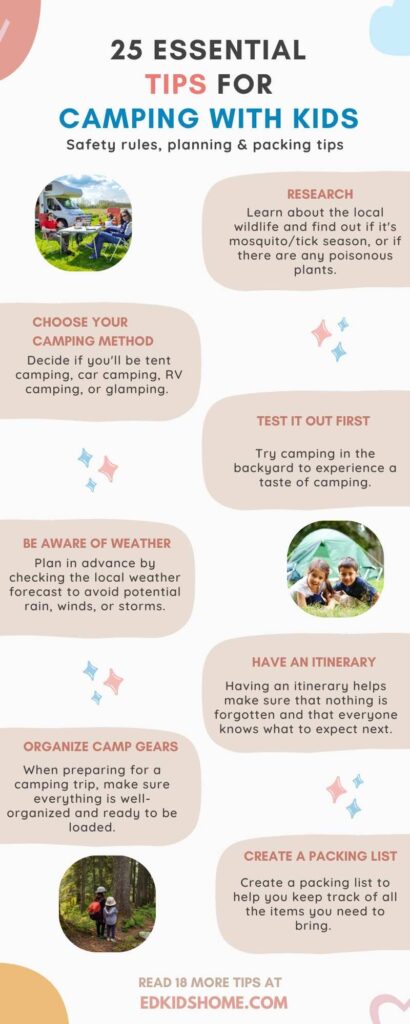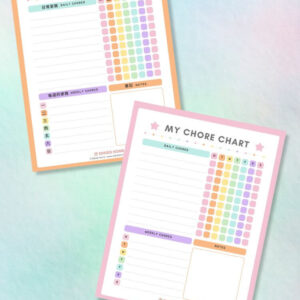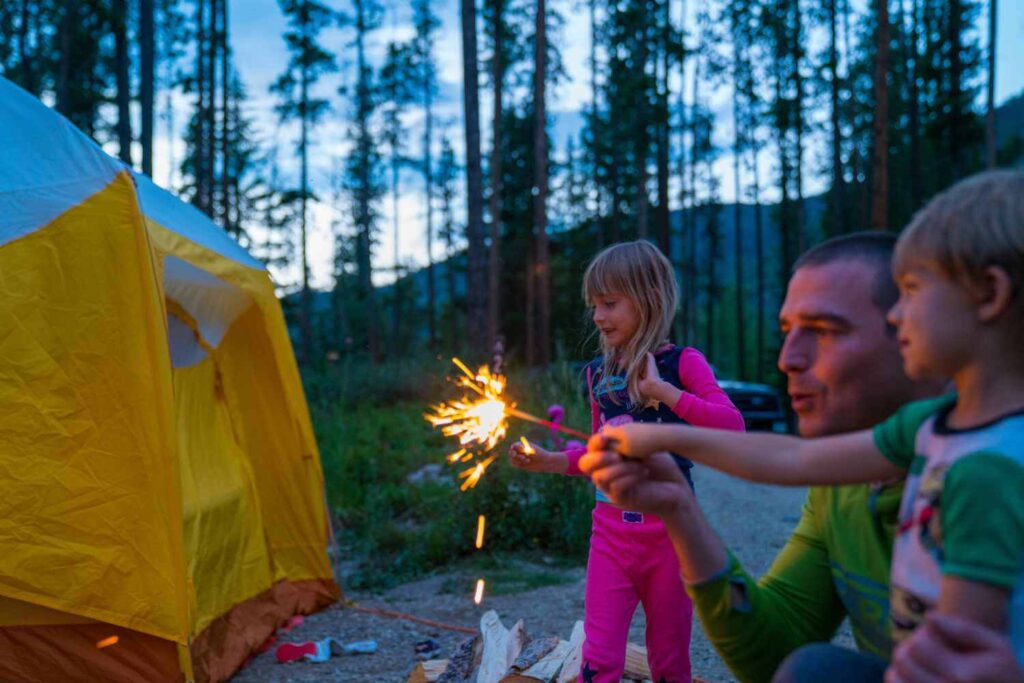
According to Condorferries, camping trips have become increasingly popular and have shown resilience to the impacts of COVID-19. Camping with kids can be a wonderful experience and create memories that will last a lifetime.
However, it is important to plan and consider all the details to ensure an enjoyable trip for everyone involved. From packing the right gear to making sure you have plenty of activities planned, there are many ways to make your camping trip with kids go smoothly.
Read: 13 Benefits of Traveling with Family
Over a decade ago, prior to our marriage and having children, my husband introduced me to camping, as I had never experienced it during my youth. We had to canoe to our private campsite and it was a memorable experience.
During the nighttime, the surroundings were enveloped in darkness, and there were only a few people in the vicinity. We would lie on our canoe and gaze at the beautiful stars, there were so many of them, enjoying nature without the light pollution.
“Camping with family is a reminder that the best things in life are often the simple things, like roasting marshmallows and sharing stories around the campfire.”
Since then, I fell in love with camping, and my family and I have made it a tradition to go on camping trips. We went camping while I was pregnant and have continued doing so even after my children were born.
We have also taken camping trips with our toddlers, and now we are preparing for another trip with our 6-year-old and 3-year-old kids. I would love to share 25 tips that we have learned from our own camping experiences to help make your next camping trip a success. Additionally, I have included 5 extra tips specifically for anyone camping with babies or toddlers.
Related: 22 Best Road Trip Tips For Travelling With Kids (Educational)
What are the Benefits of Camping with Kids?
What I love about camping is that it is the best way to get away from the city and away from technology, allowing a genuine connection with nature and a chance to bond deeply with it. The fresh air scent the fire burning in our fire pit create a sense of relaxation for me and help to alleviate stress.
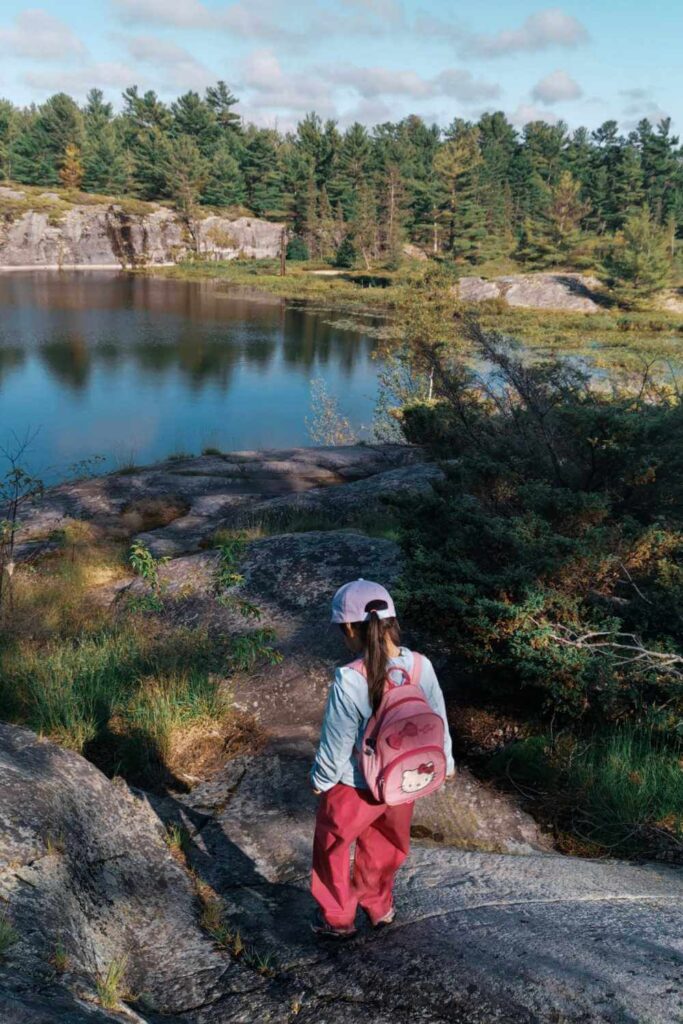
Don’t forget to take a few deep breaths, soak up the beauty of nature, and enjoy the moment. There is something special about camping that allows people to slow down, appreciate the simpler things in life, spend quality time together as a family, and relax without all of the everyday distractions.
25 Tips for Camping With Kids
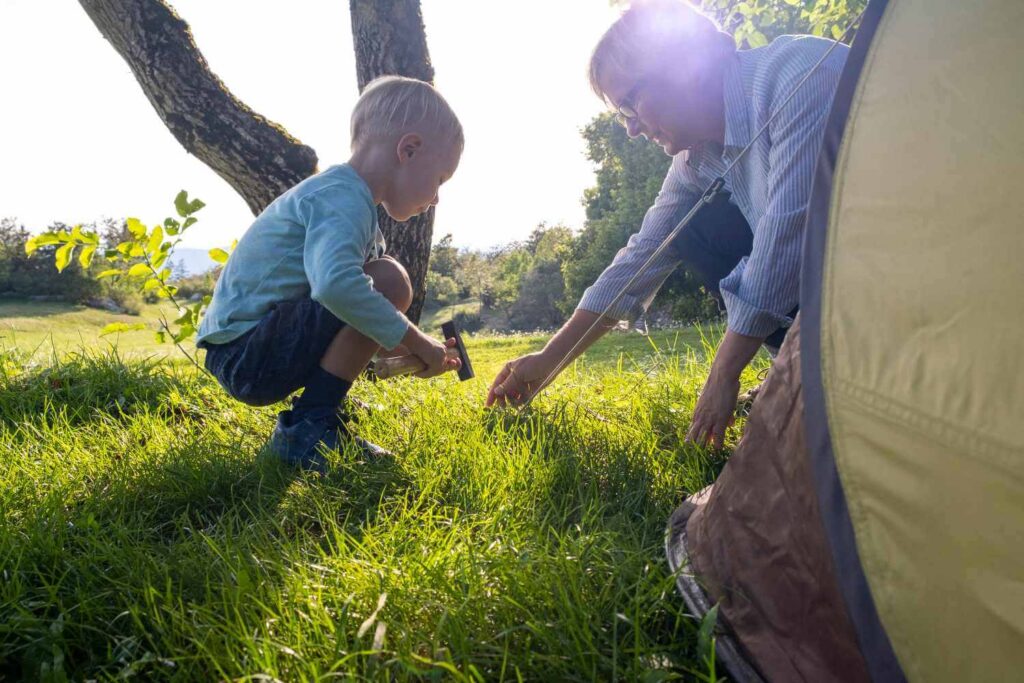
Here are 25 tips I would love to share that may help you and your family be well-prepared for your upcoming camping trips.
1. Research
Before going camping, it’s recommended to research your chosen location. Learn about the local wildlife and find out if it’s mosquito/tick season, rattlesnake season, or if there are any poisonous plants nearby.
This will help you take necessary precautions before your trip, such as bringing bug spray and warning kids about poison ivy.
Note: Check out any specific rules/ regulations for the park you should be aware of.
2. Choose a Suitable Campsite
Do research on campgrounds and look for one that would be suitable for your family. Consider the amenities that it offers, cost, security, and location. Make sure there are kid-friendly activities nearby such as playgrounds, lakes, beaches, or hiking trails.
If you’re going on a camping trip with your kids for the first time, I suggest picking a nearby location. This way, if you or your kids are not enjoying the experience and want to leave, it will be easy to get back home quickly.
It’s important to avoid having any wet or marshy areas, as well as standing water like puddles or ponds, around your campsite, as this can attract mosquitoes.
Note: You can know more about how to select a good campsite before you book it.
3. Choose Your Camping Method
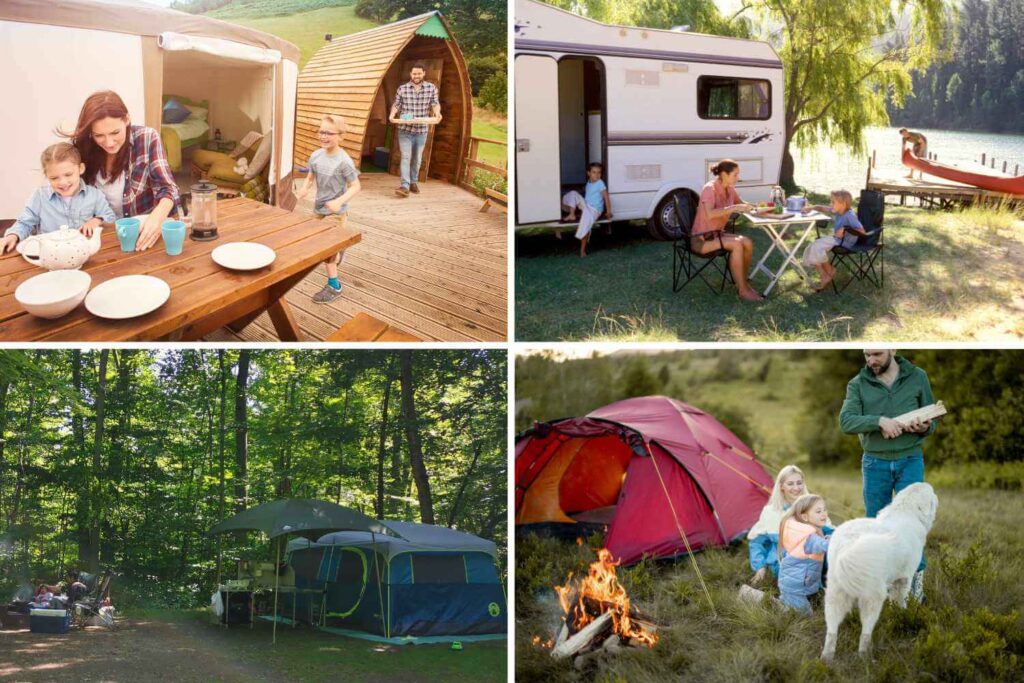
Decide whether you’ll be tent camping, car camping, RV camping, or glamping. This decision should be based on the duration of your trip, budget, the size of your group, and the number/age of your children. All these factors will help you decide which type of camping fits your needs best.
Initially, we chose to go glamping when we didn’t have kids. However, when we added more young members to our camping trip, we had to give up some of the “fancy” gears and stick to the essentials.
Personal Tip: If you want a comfortable camping experience, try car camping where you can drive directly to your campsite.
4. Set Camping Ground Rules with Kids
Before your trip begins, be sure to establish some ground rules for safety and respect while exploring the outdoors with your children. This will help ensure everyone has a good time and can keep disagreements or accidents to a minimum.
This includes not running around or wandering off without adult supervision, wearing a life jacket when swimming in the water, and respecting nature by not disturbing animals or picking flowers. Also, be cautious of plants that may be poisonous.
5. Food Preparation
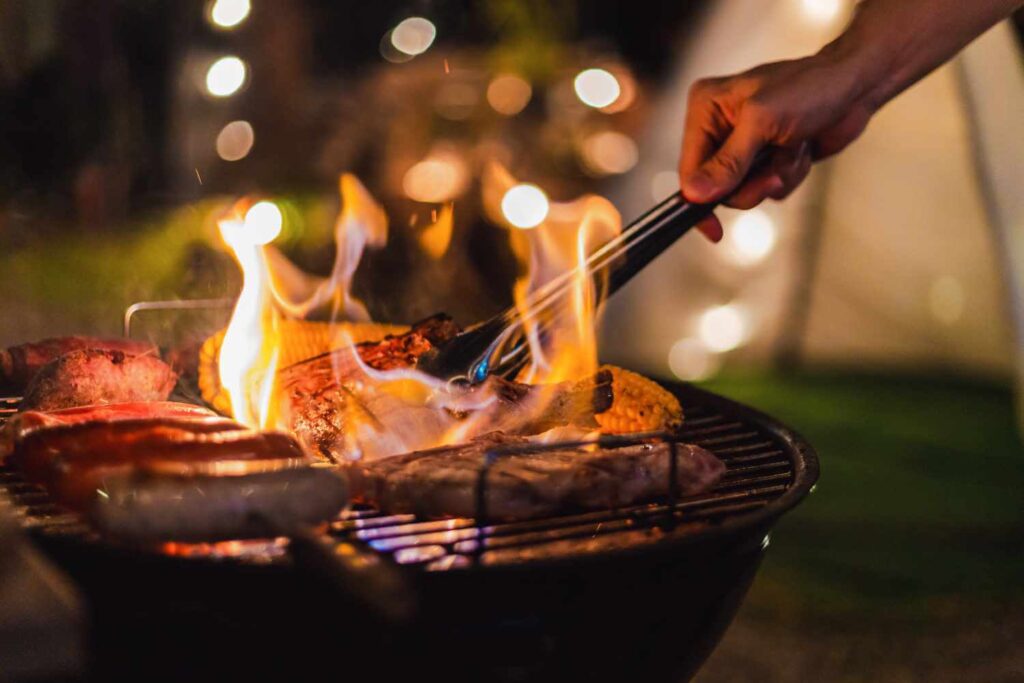
Plan what food to bring and how you will cook it. If you’re on a budget, opt for simple meals that won’t require multiple ingredients or a lot of prep time.
Here are some simple camping meals that are perfect for families with kids:
- Hot dogs and hamburgers cooked over a campfire or on a portable grill/ stove
- Foil packet meals: wrap meat, veggies, and seasonings in foil and cook over the fire or on a portable grill/ stove
- Grilled cheese sandwiches cooked over the fire or on a portable grill/ stove
- Pasta with canned sauce and meat cooked on a portable grill/ stove
- S’mores: graham crackers, chocolate, and marshmallows toasted over the fire for a classic camping treat
- Trail mix and other easy-to-pack snacks for on-the-go munching
- Canned soup or chili heated over the fire or portable grill/ stove
Remember to pack plenty of water and other drinks, as well as utensils, plates, and napkins for a successful and stress-free camping trip.
In addition, make sure to pack a cooler box with ice packs for perishable food items as well as drinks.
Note: Do not keep any food near or inside your tent as it may attract wildlife. Keep food stored in airtight containers or in a cooler box to prevent animals from getting into your supplies.
6. Try Camping in Your Backyard with Kids
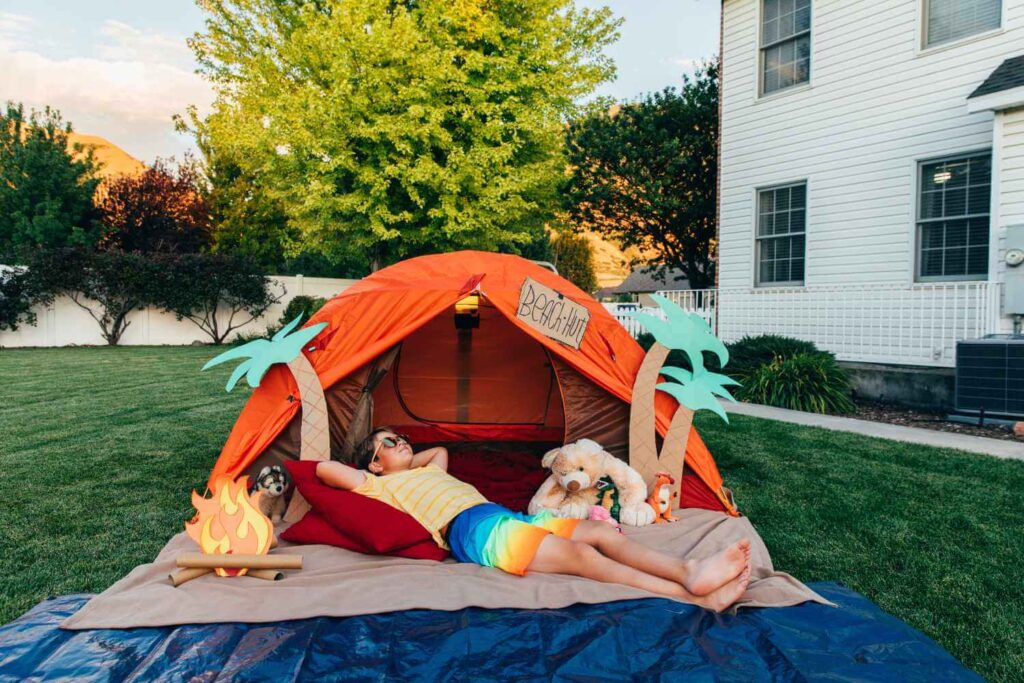
We enjoy putting up a tent in our backyard for the kids to experience a taste of camping. It’s amazing how much they love tents! However, we have not attempted to sleep in our backyard tents due to the noise from the city.
This will give you a sense of how to set it up and make sure everything is working properly.
7. Be Aware of the Weather
When camping, it is crucial to consider the weather conditions. Plan in advance by checking the local weather forecast to avoid potential rain, winds, or storms. Keep in mind that unpredictable rain and other harsh weather conditions may suddenly come up without warning.
Note: To be better prepared, consider checking for local forest fire and flash flood warnings in addition to the weather forecast. You may also want to check the status of the interstate to avoid getting stuck in traffic. Don’t forget to check your local weather-related forecast as well.
Rain
When you are camping overnight in the woods, it is common to experience rain. If it starts raining while you are setting up your campsite and canopy cover, wear disposable ponchos and appropriate footwear. Once everything is set up, you should be alright.
It’s also a good idea to bring some indoor tent activities (such as card games or coloring books) in case of unexpected weather so that your camping trip can still be enjoyable.
8. Have an Itinerary
Don’t forget to plan out the details of your trip, elsewhere you’ll be staying each night, and what activities you have planned for the day. Having an itinerary helps make sure that nothing is forgotten and that everyone knows what to expect next.
Personal Tip: I strongly advise you to plan out the specifics of your schedule, particularly on the first and last days of your camping trip. These days can be quite hectic since you will need to set up the first day and also pack everything up on the last day, all within the specified check-in and check-out times. It is essential to plan the details of your schedule meticulously, including hourly planning.
9. Prepare Camping Equipment
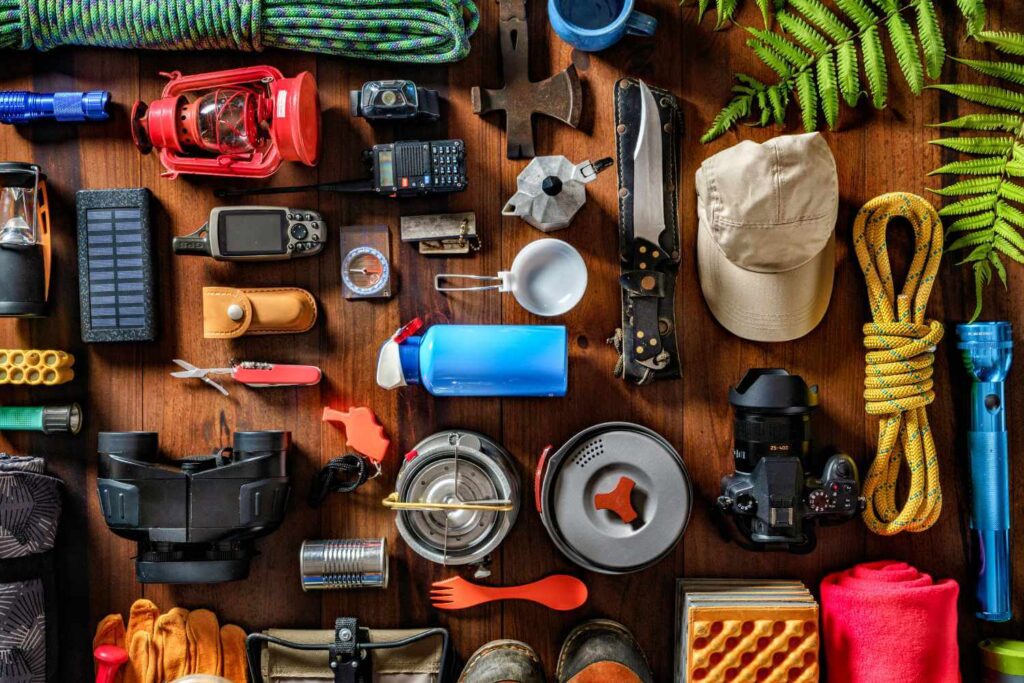
When my husband and I first started camping, we had plenty of gear he had collected over the years. However as our family grew, we needed more equipment, like larger tents, to accommodate everyone.
Rent or Borrow
If you’re new to camping, my suggestion is to borrow camping gear from friends and family initially. This will help you figure out whether or not you like camping before buying your own equipment.
Personal Tip: Ensure that you learn how to set up and pack all the camping gear correctly to avoid replacing any broken items.
Invest in camping gear you’ll use
If you and your family are dedicated to camping and plan on doing it every year, that’s a good time to start purchasing camping gear.
It is practical to buy equipment that can be utilized for other family endeavors like buying a cooler box and camping chairs.
In addition, you will require a tent, sleeping bags, flashlights, and sleeping pad/ air mattress (for more comfortable experience) for sleeping.
Set up a screened canopy tent
If you’re going to be camping when the mosquitos or other bugs are out, it’s nice to have a screened canopy tent to relax that’s in the shade and free from bugs! Especially when you have kids! Plus, this is a perfect place for them to play games, read books, or color on the ground.
10. Create a Packing List
Create a packing list to help you keep track of all the items you need to bring. This will ensure that you don’t forget anything.
To pack efficiently, avoid including unnecessary items like clothes you might wear “just in case.” Instead, pack for various weather conditions and make sure to bring extra rain gear, including a layer that can keep you warm during cool evenings despite hot days.
Pack for outdoor activities such as going to the beach, hike, canoeing, etc.
Pack Campsite Entertainment
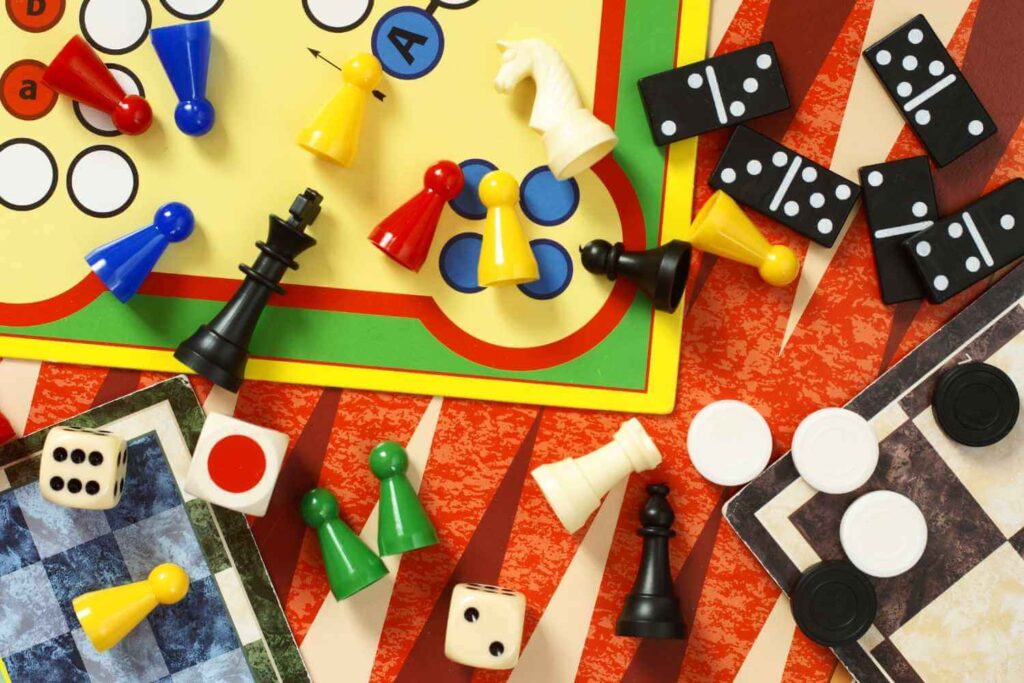
To keep everyone happily occupied during your camping trip, plan some fun activities ahead of time. These can include outdoor games such as frisbee, badminton, or volleyball. You may also want to bring along a few books for reading around the campfire.
Additionally, if you have access to a beach or lake nearby, consider planning some swimming activities.
Board and card games are convenient for camping because they can be easily packed and played on a picnic table or inside the tent. Additionally, they are ideal for playing during rainy weather.
Here are some ideas:
- Uno
- Board games
- Cards
- Playdough
- Fun Activities of Learning ‘木’
- Writing Journal
- Teach Kids to write Chinese Characters
Personal Tip: Ensure you have something for your kids to do when they wake up.
Portable potty to avoid accidents
This portable potty is extremely helpful when camping with young children as it eliminates the need to trek to the washroom, which may be too far away. It’s particularly handy for urgent bathroom trips that can be taken right inside your tent.
Bring a lot of snacks
If you’re camping with kids, snacks are a must! Kids get hungry often, so it helps to pack plenty of snacks for the entire trip. Bring some protein-rich snacks like nuts and trail mix as well as some sugar-filled treats like candy and cookies.
Personal Tip: Having a variety of snacks can help keep your family’s energy levels up during the trip.
Bring lots of layers
It can get pretty chilly at night when you’re camping, so bringing long sleeves, hoodies, and jackets is a good idea! That way you can just take things off as you warm up during the day!
Don’t forget lanterns and flashlights
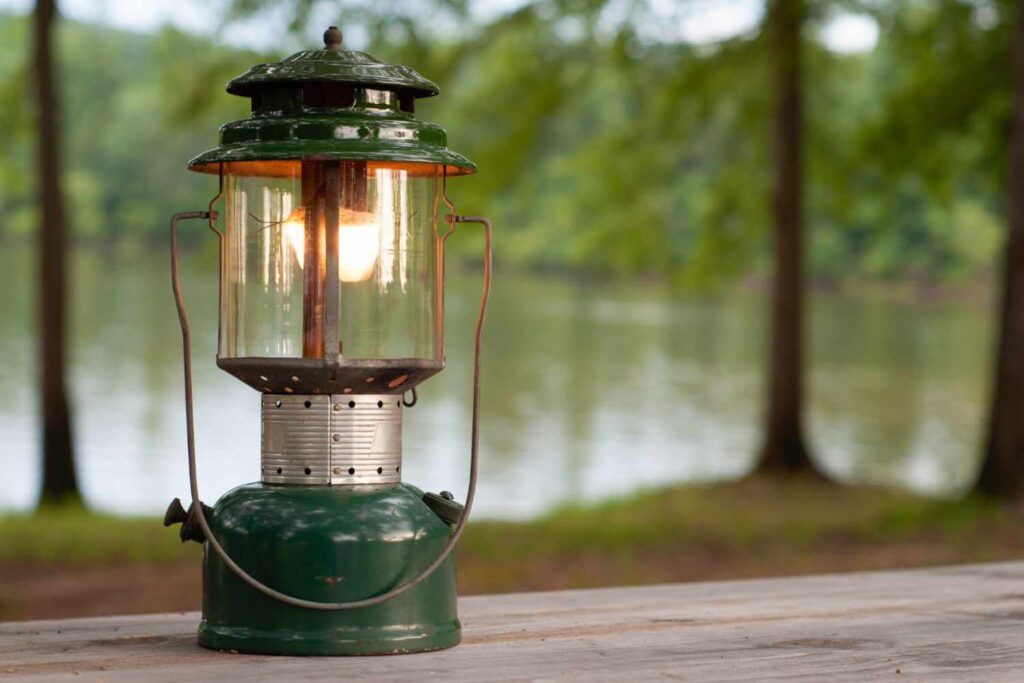
Having a few lanterns and flashlights handy during camping is essential. Not only do they help navigate the area, but they can also be used for fun activities like flashlight tag or reading books while curled up in the tent.
I find propane lanterns are the best when it comes to nighttime. They are much brighter and last longer than traditional flashlights.
Personal Tip: Headlamps are also very useful when you need to work on something with your hands. But I also find them annoying since they attract bugs (a mosquito mask may resolve this.)
Pack lots of water
We use a huge outdoor water tank to store drinking water. This tank is always filled before the camping trip starts and also during our stay. Depending on where you go, a water source may not be available in the area, so it’s important to make sure you have enough drinking water for everyone throughout your entire camping trip.
Keep the bugs away!
From my camping experiences, I find there are different severity of attracting bugs. In general, whatever works for you in the past, it will most likely work.
Personal Tip: We find that the most effective mechanism is the Thermacell.
There are other bug methods to repel insects:
- Essential Oil Bug Spray
- Natural Patch Stickers
- Electric Bug Zapper (Only works at night)
Pack a First Aid Kit
It’s best to be prepared for any medical emergency while camping. Make sure you have a well-packed first aid kit that includes adhesive bandages, antiseptic wipes, and gauze. If you plan on any outdoor activities, consider bringing an extra first aid kit for those.
Be sure to also bring a thermometer and medication for fever, allergies, and pain relief. You can never be too prepared when it comes to medical-related emergencies.
Lastly, learn CPR before your trip in case of extreme emergency situations. Having the ability to provide basic medical help to your family can be a lifesaver!
Other Personal Items You Shouldn’t Forget
- Toiletries
- Towels
- Suitable footwear
- Toilet paper (Backcountry camping)
- Sunglasses
- Hats
- Hand sanitizer
- Sunscreen
- Baby wipes
- Camp chairs/ Camp chair for kids
11. Organize Camp Gears
When preparing for a camping trip, make sure everything is well-organized and ready to be loaded. Sort your belongings into categories and pack them accordingly. It is advisable to use separate totes or bins for each type of supply.
- Dry food & supplies
- Camp gear
- Coolers full of cold/perishable foods
- Miscellaneous
Car storage: Plan where everything goes
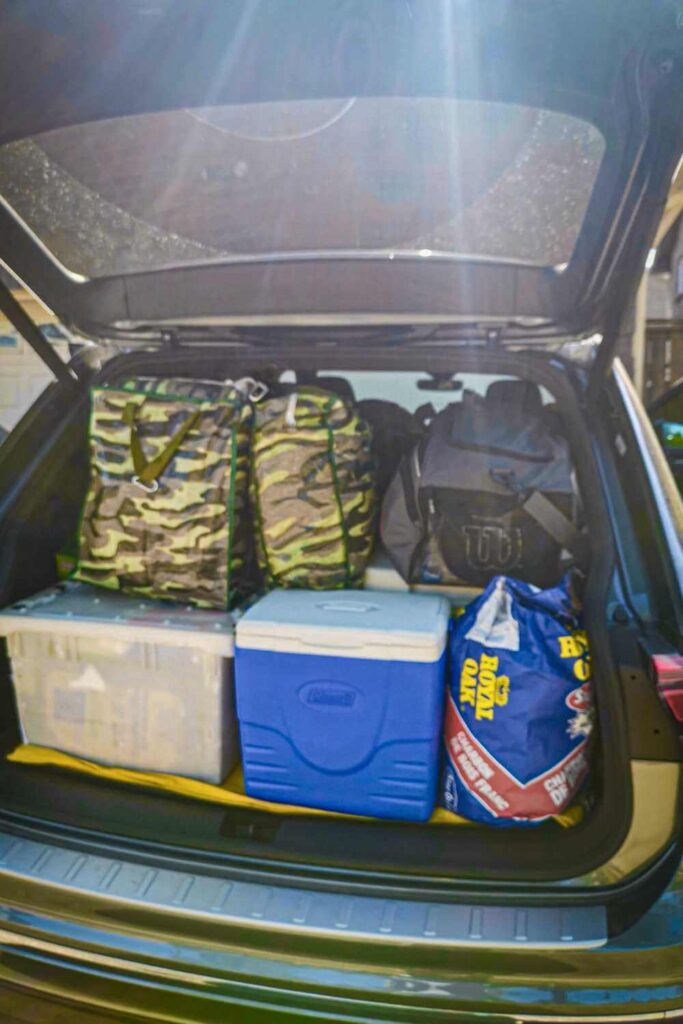
Prioritize planning the placement of your belongings in your car. It’s important to consider the space available in your car and whether or not it can accommodate all your camping gear and other necessary items. This can help you decide which items to bring and how to properly place them in your car.
Personal Tip: To create storage space in the basement, my husband measures the size of our car trunk and marks out the corresponding area. He puts our gear and crates in this area to estimate if they will fit in the trunk. If there’s enough space, we can add more items. If not, we have to remove some from our packing list.
12. Eat Before Arriving at Campsite
If you have young children, it may be a good idea to eat prior to arriving at the campsite because you will have competing priorities between setting up the campsite and cooking.
Personal Tip: We usually go to McDonalds or other quick restaurants during our car ride for a quick lunch.
13. Assess the Camp Site
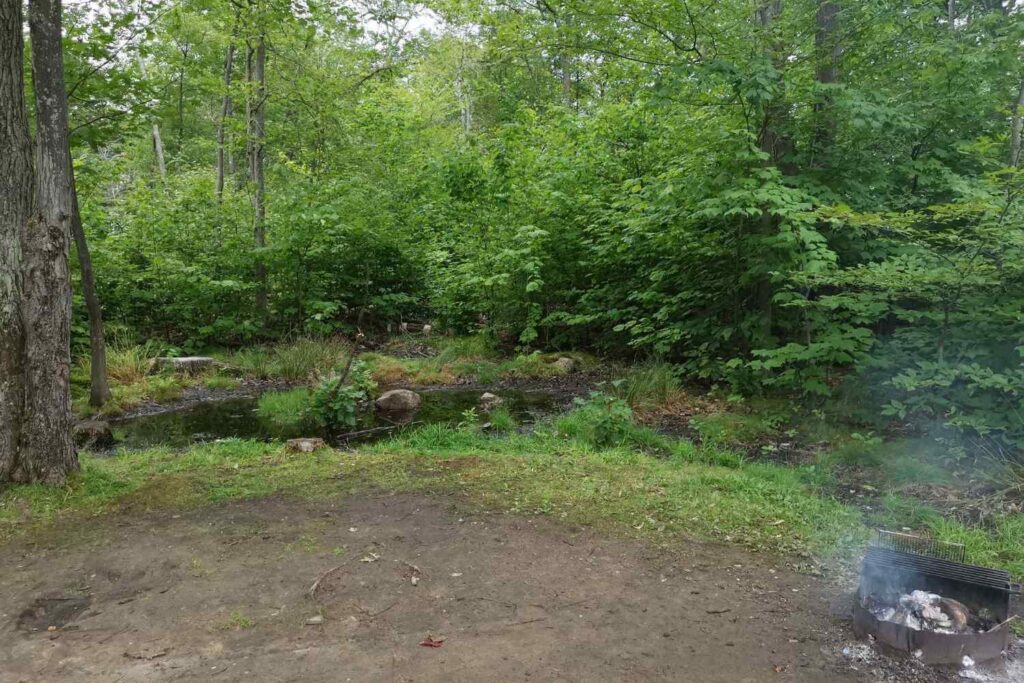
Walk around the campsite to pick the best spot to pitch your tent or set up your camping gear. Look for a flat, dry, and level spot that is away from hazards such as dead trees or areas prone to flooding.
14. Set up Camp Right Away
Get the kids involved with a chore, like gathering kindling. Set up the tent first. Then, if you’re planning to cook over a fire, get it going right away.
We suggest that you pitch your tent before unloading your belongings at your chosen spot. It’s best to do this before it gets dark unless you have a rooftop tent or a camper. To keep your tent clean, spread a plastic tarp beneath it before pitching it to keep dirt and dust out. This way, you’ll have a tidy tent to enter.
15. Check Out Park Programs and Activities
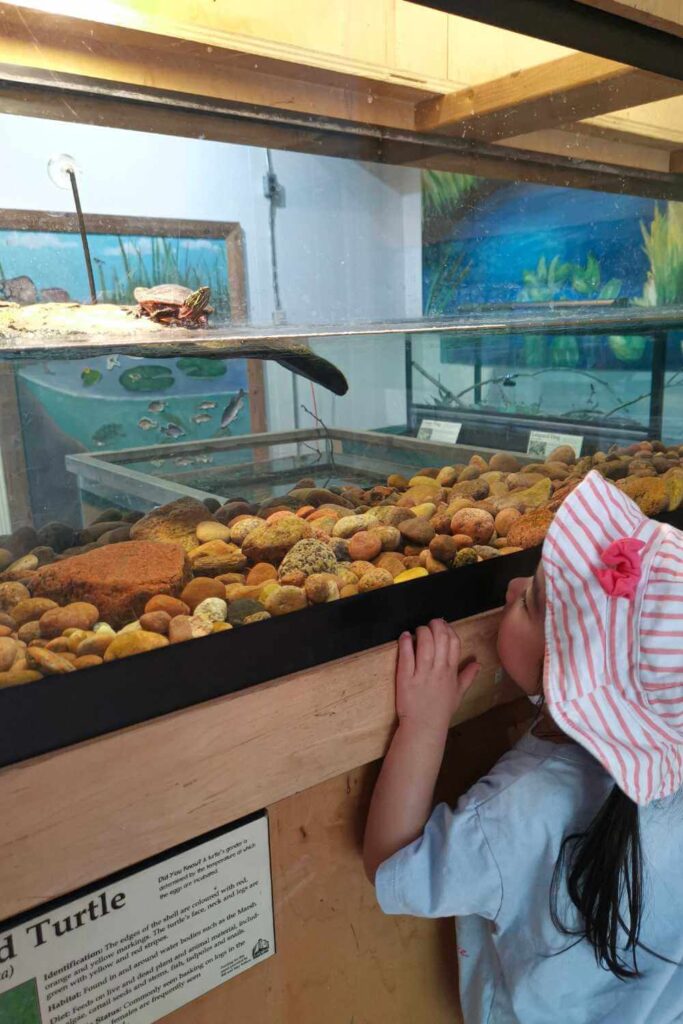
Many parks offer fun, educational programs or activities — from hikes to stargazing. Kids love getting involved in hands-on activities that will teach them about the natural world around them. It’s also a great way to introduce your children to nature and wildlife while having fun! Check out what your park has to offer before you go so you can better plan your trips.
Go to a Beach
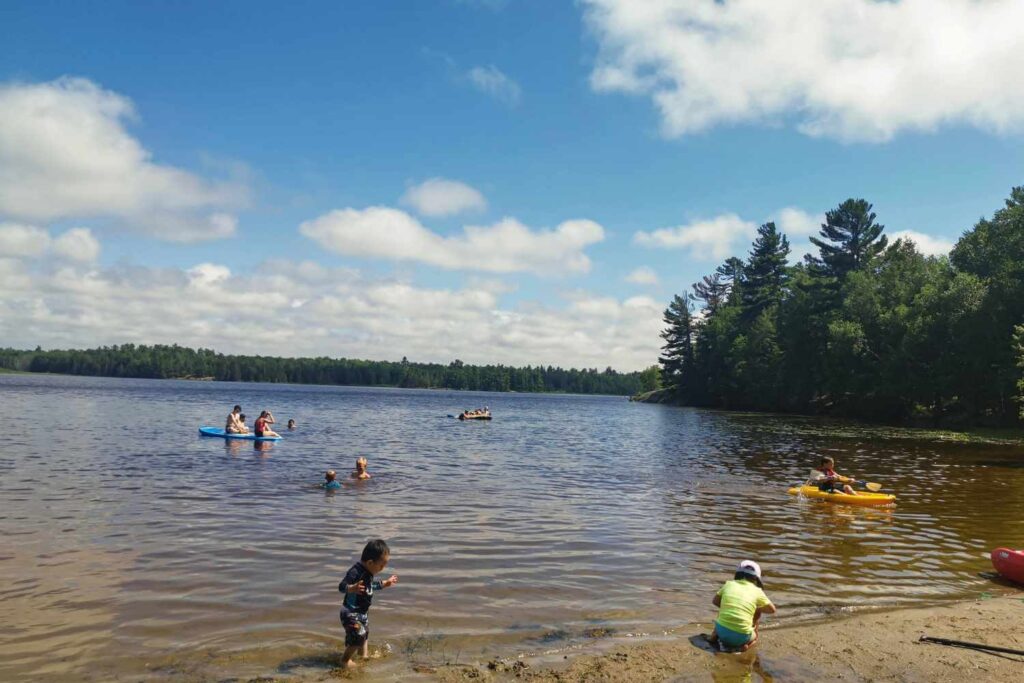
If you’re camping near a lake or beach, going to the shore can be a great way to spend your day. Make sure everyone wears swimsuits and has water shoes just in case they need to get into the water. You can also bring shovels and buckets so little ones can explore and build sandcastles.
16. Try Something New
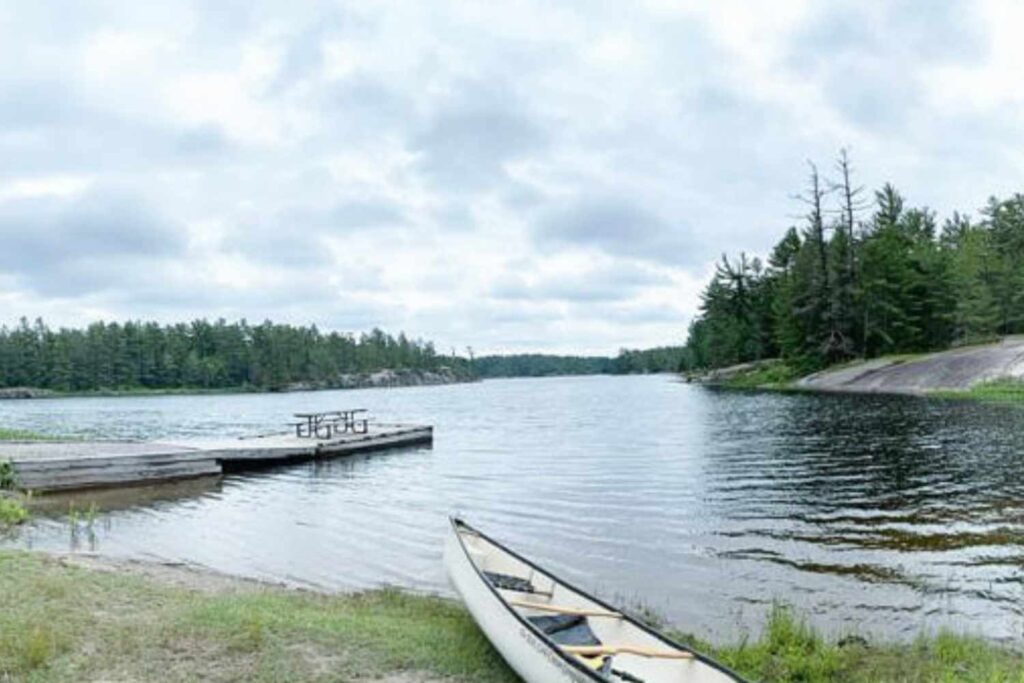
As a family, you can take advantage of this opportunity to explore something new. You can consider trying kayaking, a beginner’s ropes course, or fishing. By doing this, you will demonstrate to your kids the importance of stepping out of their comfort zones, embracing new experiences, and having fun while doing it. This is a valuable lesson for them to learn.
17. Prepare for Some Surprises
Hide some snacks and games without informing your children and reveal them at specific times, such as during a pre-dinner meltdown. Surprise them by keeping the snacks and games a secret until they get bored.
18. Let Kids Explore Nature
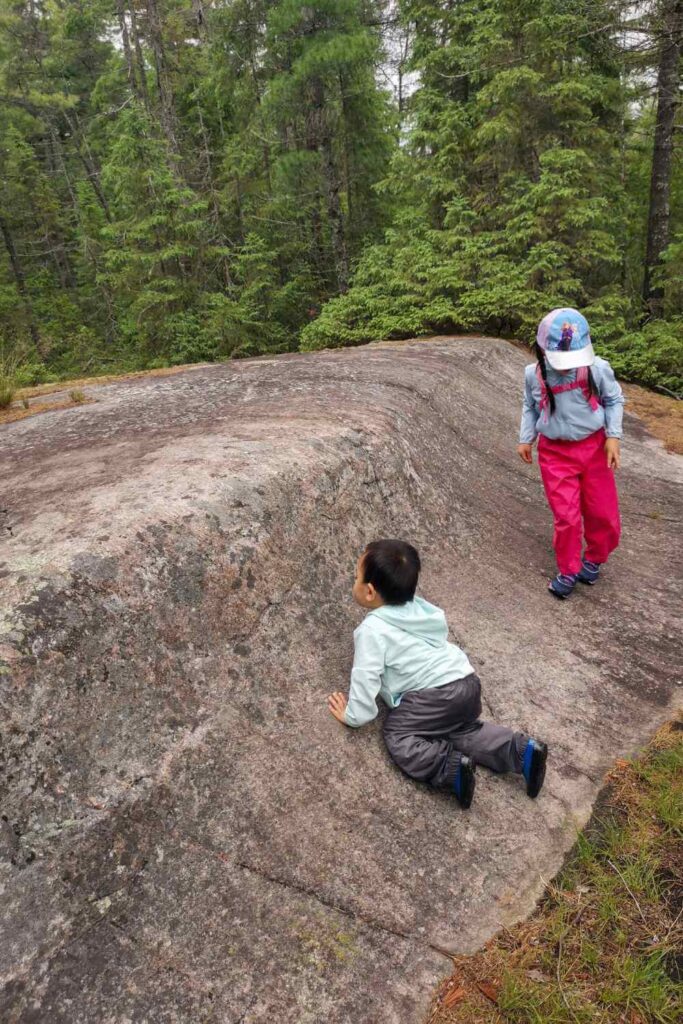
Once you’re set up, take a few minutes to let the kids explore. Let them find something interesting—a bug, a feather, a leaf or rock—and look at it together.
Hold one family activity each day. Nature walks are always fun when camping with kids! Bring along binoculars and magnifying glasses so they can observe valuable things up close.
19. Assign Some Responsibilities to Your Kids
Giving your children responsibility will make them feel that their opinion matters and keeps them actively engaged in the camping experience. Assign them chores that are age-appropriate, such as helping set up the tent, collecting firewood, cleaning dishes after meals, etc. This will help to keep things organized and also teach them important life skills like organization and independence.
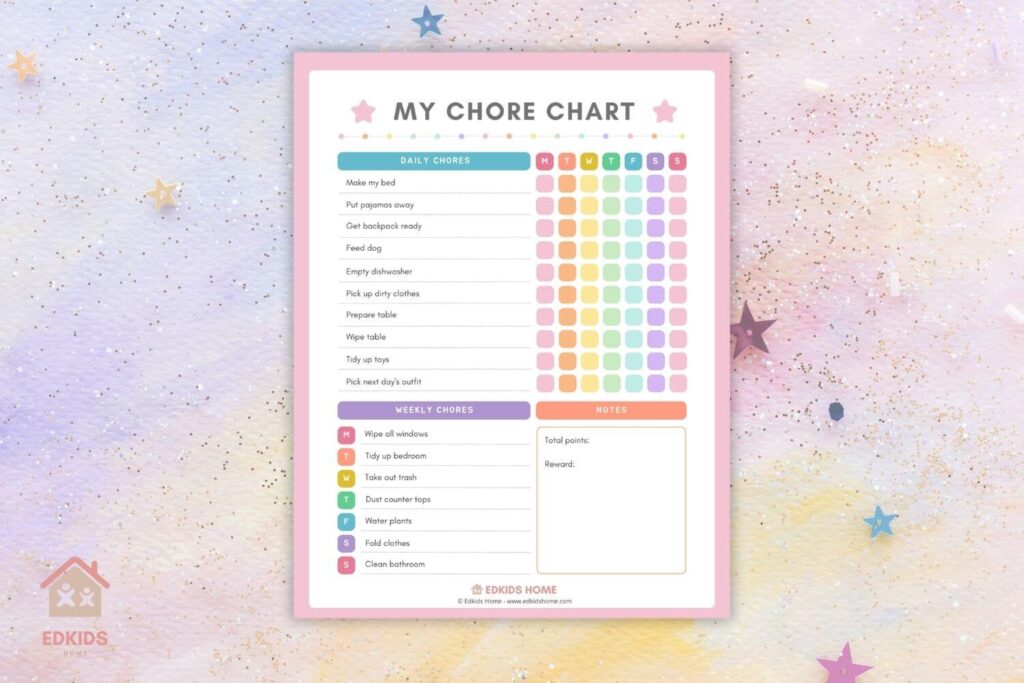
You can check out our free chores printable to make this easier for you and your family!
20. Allow Risky Play
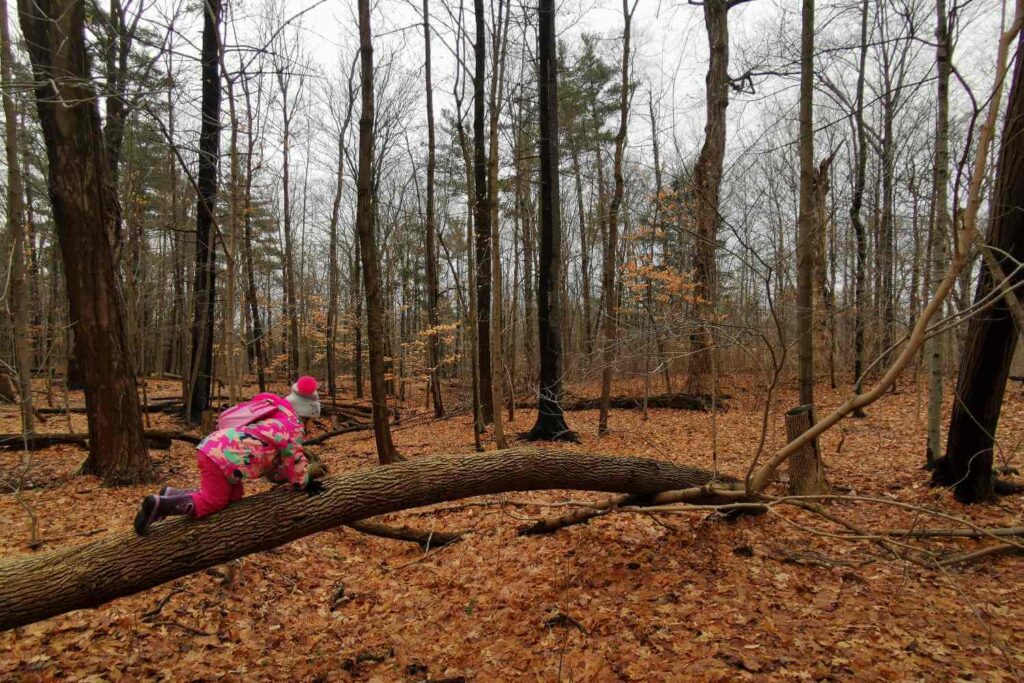
The meaning of ‘risky play’ varies according to the specific risks involved, your child’s age, and their abilities. However, it is valuable because it helps your child learn how to be adaptable, confident, focused, manage their fear, and exercise self-control. If supervised, camping can be an ideal location to promote such play by letting your child climb trees, explore new things, and challenges themselves.
21. Embark on a Camping Scavenger Hunt with Kids
Scavenger hunts are fun, and it’s a great way to get kids out the door and learn about nature. It also helps build confidence in them as they expand their outdoor knowledge base.
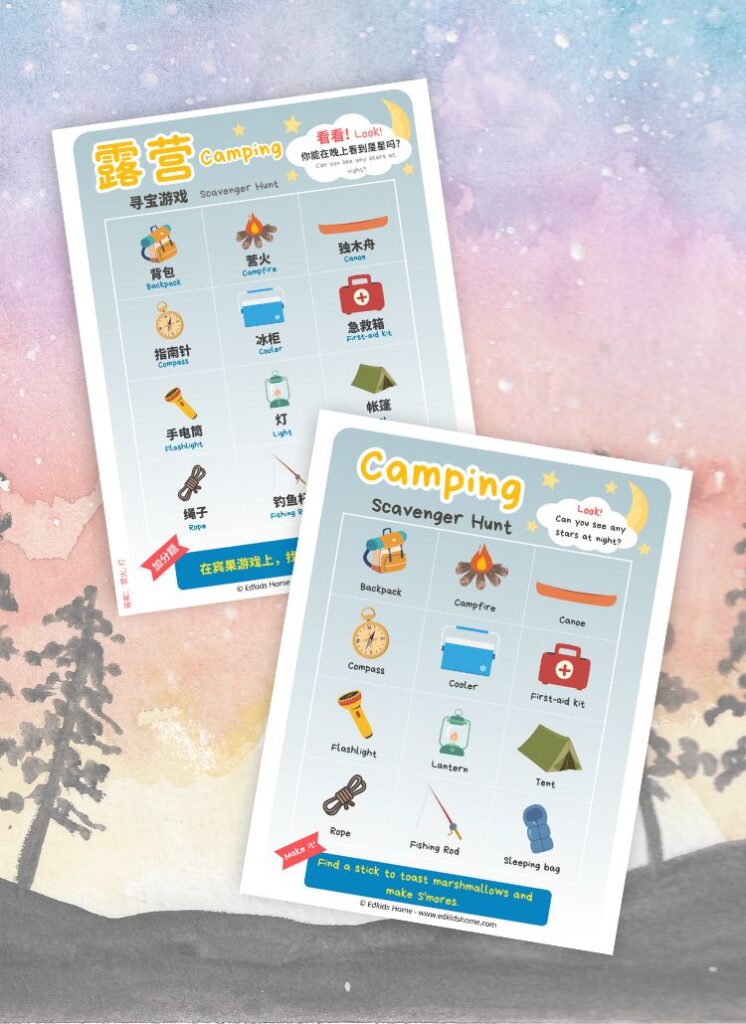
We have a free camping scavenger hunt printable to share with you.
Related: 17 Free Road Trip Printables for Kids: English, Chinese, French
22. Take a Shower Before Dawn or Earlier (If Possible)
I would recommend showering during the early afternoon and morning for the cleanest shower stalls. Keep in mind that in the wilderness, it may be difficult to shower when it’s dark, so plan accordingly. Additionally, it’s better to avoid showering during evening times as some bugs are attracted to the smell of shampoo and soap.
23. Tell Stories by the Campfire
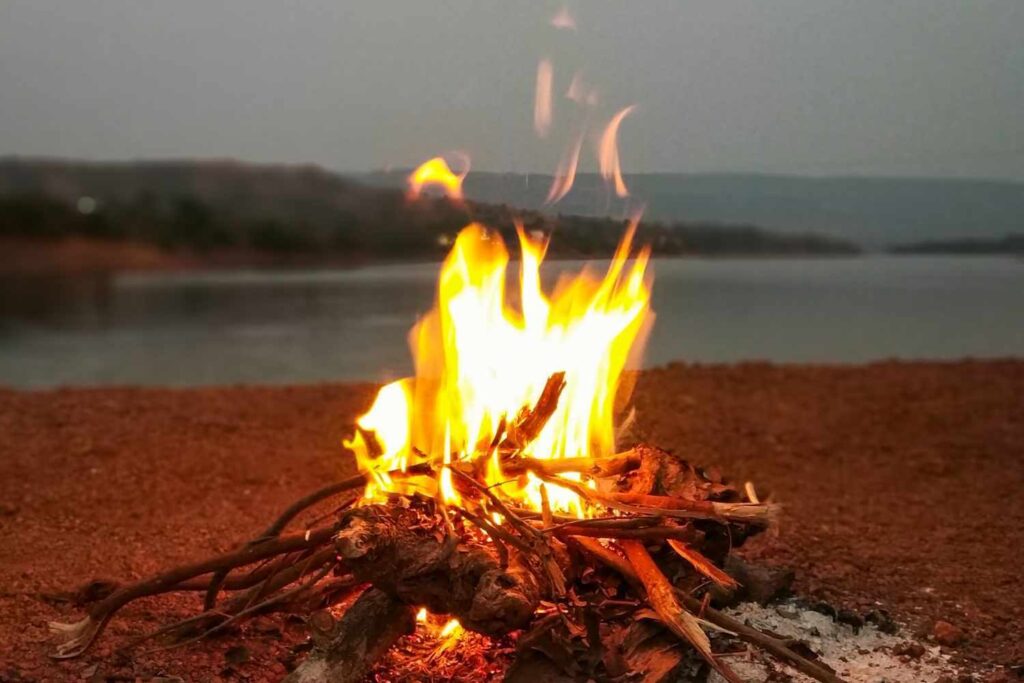
“Light a campfire, and everyone’s a storyteller“
John Geddes
Storytelling around the campfire is a tradition for many families. Not only are stories fun, but they can also help instill values and life lessons in your children. Before this year’s camping trips commence, sit down with your kids and come up with some stories you all can tell when by the fire at night. This will get them engaged and excited for the experience.
24. Take Part in This Last Activity
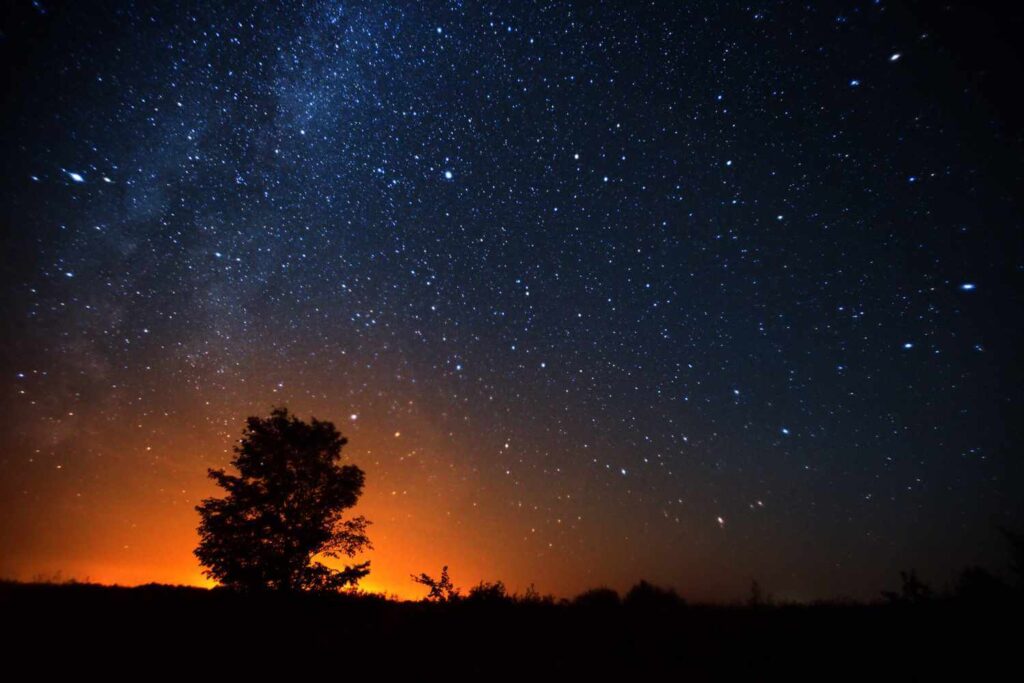
At the end of the day, when everyone is tired and ready to call it a night, make sure you all take part in one last activity like counting stars or listening to nature sounds. It will help create a memorable experience that can be remembered for years.
25. Maintain a Bedtime Routine
Make sure to end each night with a bedtime routine.
A bedtime routine is important while camping to ensure everyone gets enough rest. Once the sun sets, turn off all electronic devices and transition into a relaxed activity like reading or telling stories under the stars before tucking your kids in for the night. This will help them wind down and transition into sleep mode.
5 Bonus Tips for Camping with Young Kids (Babies/Toddlers)
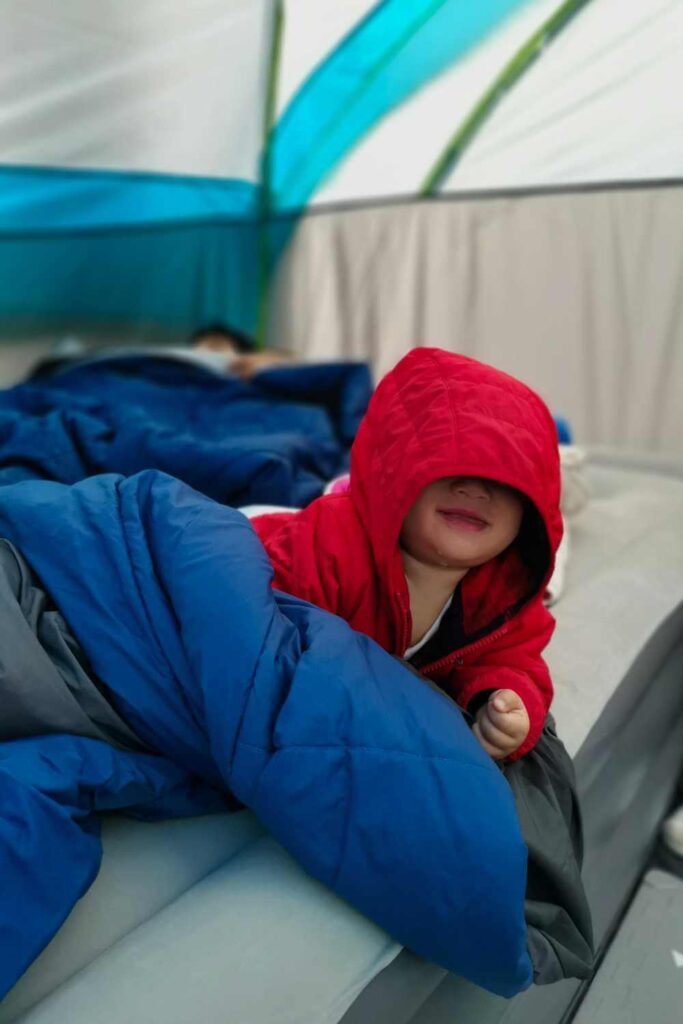
If you are camping with a baby or toddler, there are some additional tips you should keep in mind.
1. Make Arrangements for Sleeping
Make sure you have a safe, cozy place for your baby or toddler to sleep. Bring along a pack-and-play, and consider packing an extra blanket or two to keep them warm at night.
Personal Tip: We bought a snowsuit for a cost-saving solution to keep our toddler warm at night, it was around springtime.
2. Bring a Booster Seat
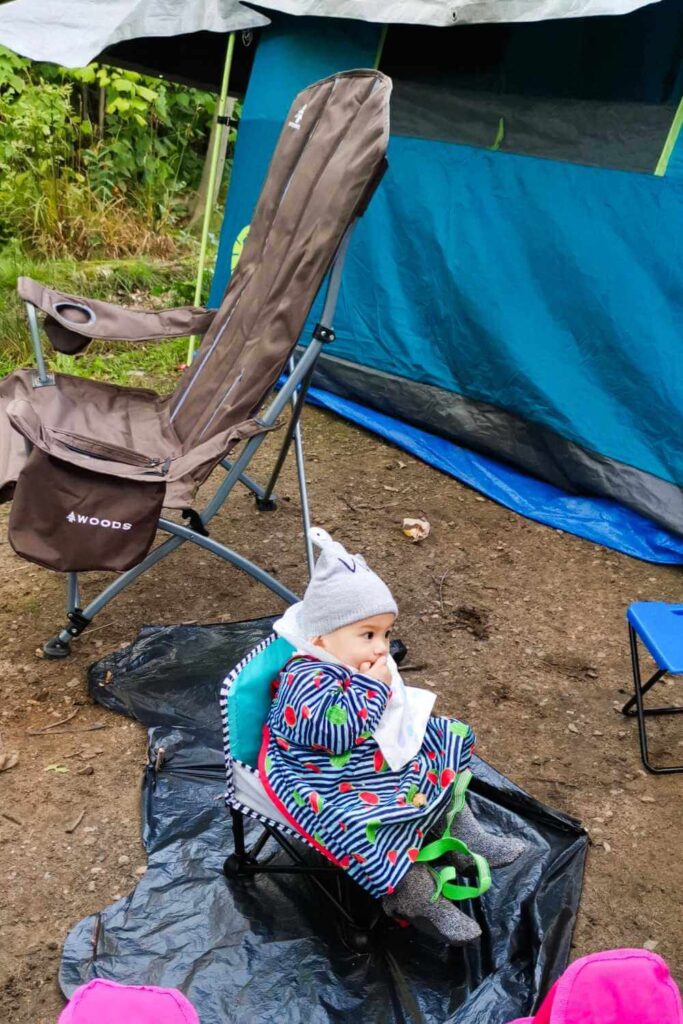
If you’re traveling with young children, bring an inexpensive booster seat to keep them contained while eating and prevent messes.
Personal Tip: You can let them play with toys while seated in their own chairs.
3. Bring a Baby Carrier/ Hiking Backpack
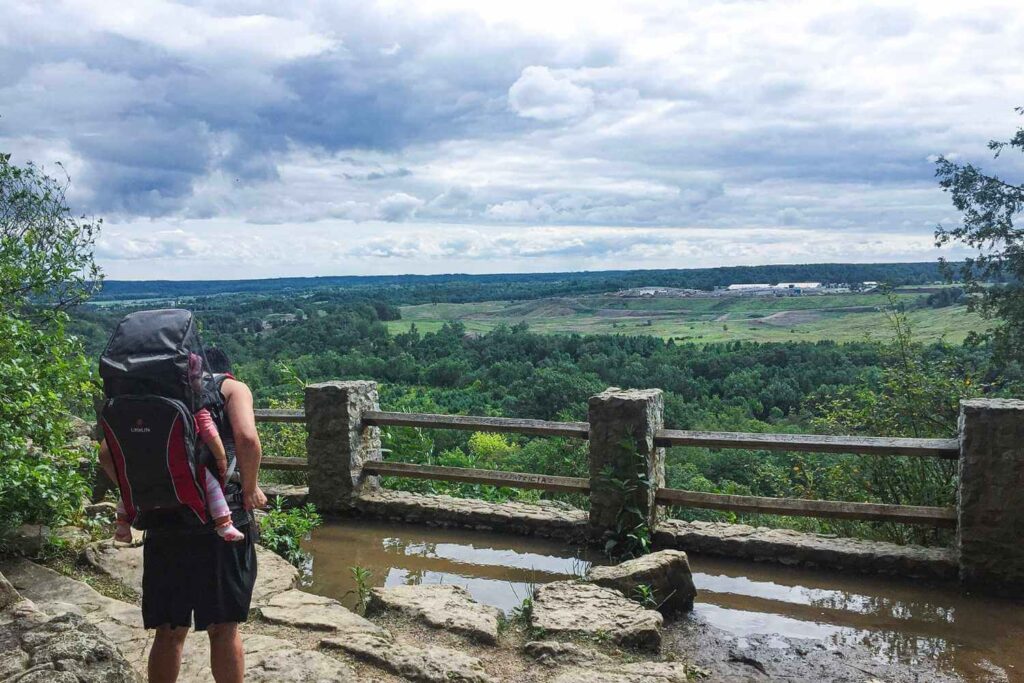
Bringing a baby carrier is a great way to keep your little one close while out exploring. This will also free up your arms and hands so that you can easily carry camping gear and other items.
Personal Tip: We find hiking backpacks way too heavy so I would not recommend getting them unless you are up for the challenge.
4. Simplify Bath/Shower Time
To simplify things, we usually shower in the public washrooms with our toddlers. If your child is too young to shower with you or you prefer to bathe them separately, you can use a foldable wash basin to fill with warm water.
5. Put Baby/Toddler Items in Their Own Containers/Boxes
Basic everyday essentials for your baby/toddler should be easily accessible. Do not forget to bring extra diapers, wipes, itch/rash creams, or their favorite toys. Put them all in one box so you won’t have to search through the bags when it’s time for diaper changes.
The Last Thing You Need to Know About Camping with Kids
Here are the 25 tips for camping with kids:
- 1. Research
- 2. Choose a Suitable Campsite
- 3. Choose Your Camping Method
- 4. Set Camping Ground Rules with Kids
- 5. Food Preparation
- 6. Try Camping in Your Backyard with Kids
- 7. Be Aware of the Weather
- 8. Have an Itinerary
- 9. Prepare Camping Equipment
- 10. Create a Packing List
- 11. Organize Camp Gears
- 12. Eat Before Arriving at Campsite
- 13. Assess the Camp Site
- 14. Set up Camp Right Away
- 15. Check Out Park Programs and Activities
- 16. Try Something New
- 21. Embark on a Camping Scavenger Hunt with Kids
- 22. Take a Shower Before Dawn or Earlier (If Possible)
- 23. Tell Stories by the Campfire
- 24. Take Part in This Last Activity
- 25. Maintain a Bedtime Routine
Here are the 5 bonus camping tips with babies/toddlers:
- 1. Make Arrangements for Sleeping
- 2. Bring a Booster Seat
- 3. Bring a Baby Carrier/ Hiking Backpack
- 4. Simplify Bath/Shower Time
- 5. Put Baby/Toddler Items in Their Own Containers/Boxes.
Camping with kids can be an incredibly rewarding experience for the whole family. With some careful planning and preparation, you can ensure that everyone has a safe and enjoyable time in the great outdoors. From packing snacks to setting ground rules, there are many ways to make camping with your children easier and more fun. Remember to bring along plenty of entertainment options like board games or books so they have something to do when they need a break from exploring nature. Most importantly, don’t forget to enjoy every moment spent together as a family! Pin the below image on Pinterest if like these tips and want to use it for your next camping trip.
